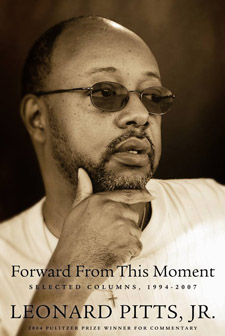ASUPS recently brought Leonard Pitts Jr. to campus. Journalist, novelist, and Pulitzer-winning commentator, Pitts has aspired to write novels from a very early age…
First published? Age 14. A poem in the local newspaper.
First professional gig? 1976. As an 18-year-old college student, Leonard began doing freelance work for SOUL, a national black entertainment tabloid. Two years later, he was the editor.
Jobs that paid the rent: Kelly “girl” (Due to the early success of Kelly Services, temporary office workers–who were usually female–became known as “Kelly girls” regardless of the worker’s gender.)
Jobs that paid the rent: Radio news writer and music reviewer during the disco era. Sample band: The Brides of Funkenstein.
When did you first start writing novels? 1976. “I have drawers full of them!” It took longer than he’d hoped to get a novel published, but he was never deterred.
Do you have difficulty switching between genres, like journalistic and creative writing? “No…each has its own set of rules. You write within the given parameters. (For instance) Writing for the ear—for radio—is very different from writing for the eye.”
When do you write? “Every single day, come hell or high water.” Leonard recommends writing each day when you are the most productive, whether that be morning, noon, or night.
What is the most important thing for aspiring writers? “Persistence!” You may be rejected dozens of times. You can’t let that get you down. Also, “Growth is in the reaching…never be content with ‘good enough.’”
Does any of that change after winning a Pulitzer? “It’s worse because expectations are even higher.”
Writing for a living can encompass a wide range of work. Whether your goal is to be a novelist or a grant writer, explore your options. You can use Career Cruising to research careers. Also, consider contacting alumni through the ASK Network. Learning about a career field through research and informational interviews can help you determine if a given field is a good match for your talents and interests. Need help getting started? Make an appointment with a CES career advisor.
© 2010 Career and Employment Services, University of Puget Sound